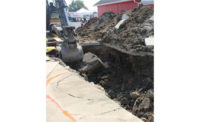A 2009 grand jury decided criminal charges were warranted; now the firms could face fines up to $2.5 million each.
Manslaughter and criminally negligent homicide statutes come with possible prison sentences. They usually are applied to drunken driving and careless use of guns. But public sentiment can prevail.
Eric E. Hobbs, a Milwaukee-based labor attorney, says prosecutors want to make a point—and even take cases they know they will lose—but there are limits to what they can do. “I don't think they are going to start chasing engineers on criminal intent. I think it would be highly unlikely and extremely difficult for a prosecutor to prove.” In the New York City cases, all the targets were either employees, self-employed contractors or company owners—not the stereotypical corporate malefactors.
Some say England's corporate homicide law, which triggers investigations into workplace-related deaths, is meant to compensate for the comparatively small damages awarded in civil court. By contrast, in the U.S., civil juries are known to confer generous awards on successful plaintiffs—a practice usually considered to be an effective deterrent.
“In England, the damages are way smaller in civil cases, and damages for killing someone are smaller still,” says Simon Joyston-Bechal, a London law partner who represented Cotswold Geotechnical at trial. “It's left to the criminal law to create the disincentive.”
The idea of responsibility in technical matters seemed to expand recently in Europe. A judge in Italy last month allowed manslaughter charges to stand against Enzo Boschi, president of Italy's National Institute of Geophysics and Volcanology, and six other scientists and technicians for failing to alert residents of the L'Aquila region in 2009 that a big quake was possible. While the technology has improved for predicting earthquakes, says Deborah S. Ballati, a San Francisco construction attorney, prosecution in the Italian case “sounds extreme.”





